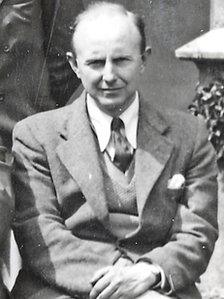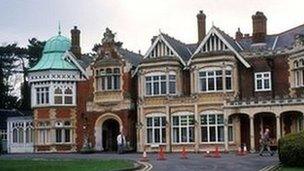Bletchley Park code breaker Frank Newte honoured
- Published

Frank Newte was a lecturer in classics at Lampeter
An unsung hero who helped crack secret German codes during World War II is being honoured by a university.
Frank Newte was a lecturer in classics at Lampeter, Ceredigion, before working at the Bletchley Park code-breaking centre for the Intelligence Corps.
He worked analysing radio intercepts in Hut 6 which was home to some of the finest minds in the country.
The University of Wales Trinity Saint David will unveil a plaque to him at its Lampeter campus later.
His secret work has only recently come to light - more than 30 years after his death.
The plaque was suggested by the Lampeter Society, the university's alumni association.
Mr Newte, an Oxford graduate, joined what was then St David's College, Lampeter in 1938 and returned there after the war in 1946.
But the highly sensitive nature of his work meant he had to use a cover story and claimed he had served in the Royal Artillery during the war.
He took his secret to the grave, dying in 1977. He was buried at St Peter's Church in the town.
In reality, Mr Newte had been recruited by the Intelligence Corps in 1939. In 1943 his unit joined the code breakers and analysts working in Hut 6 at Bletchley Park in Buckinghamshire.
Hut 6 was at the centre of the breaking of the Enigma code used by the German army and air force.
Mr Newte worked on radio intercepts, which formed the basis of the deciphering of the Enigma code.
Details of Mr Newte's academic career, war service and time in Lampeter have been pieced together by Prof William Gibson of Oxford Brookes University, who graduated from Lampeter in 1980.
Prof Gibson said: "Newte's role in the breaking of the Enigma code has not been acknowledged and it was only made public in 2011 when Asa Briggs, another wartime code breaker, revealed it in his memoirs."
Michael Smith, the author of The Secrets of Station X, the history of Bletchley Park, said Mr Newte worked for a group called Sixta (Hut 6 traffic analysts) where he would have played a vital role during D-Day and during the Allies' advance into Germany.

Bletchley Park's role in breaking German codes was kept secret for decades
"Mr Newte was one of a small group of people who were producing intelligence vital for the war effort and it would have had an impact right across the war," said Mr Smith.
"It's (the impact) not quantifiable but it existed.
"A lot of the people at Bletchley Park wanted to be on the battlefield but the impact they had on the war was greater then they could have had on the battlefield."
Bletchley's role in breaking German codes was kept secret not just during the war but for decades after and only began to emerge in the 1970s.
Mr Newte's commitment to keeping secret his wartime role meant that Lampeter has never had the opportunity to acknowledge his work.
Rachel Whitty, chair of the Lampeter Society, said: "We are delighted to honour a former member of staff who is remembered fondly by so many of our members."
- Published5 July 2013
- Published20 March 2013
- Published11 February 2013